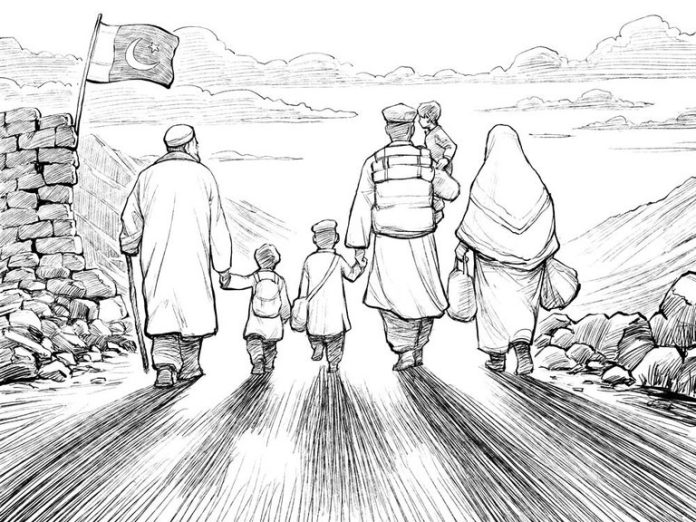Tursun Muhammad was thirteen when political persecution forced his family to leave their prosperous farm in Yarkant, Xinjiang, and flee over the Pamir Mountains.
Tursun’s father was targeted during the Cultural Revolution for his wealth and the fact that he was a landlord, Tursun told RFA. After attending Friday prayer at the local mosque he was locked up for three days.
So, he packed up his family and left Yarkant to journey into Afghanistan.
It took 45 days to reach Kabul. So high are the Pamir ranges that they are known as the “roof of the world.” The family sheltered in caves on the route. Once, Tursun passed out from lack of oxygen. An older sister died along the way.
“Her body is left on the mountain, buried in stones,” he said.
In Afghanistan, the formerly prosperous farmer sold vegetables from a cart to feed his family. Tursun learned to be a tailor, and as a young man started a family of his own with another Uyghur refugee, until fighting in the country forced the Muhammads to move again, this time to Pakistan.
Now, decades later, the family’s legacy of rootlessness may soon pass to Tursun’s son, Turghunjan, who along with his wife and their three children are part of a small ethnic Uyghur community of Afghan refugees in Rawalpindi, Pakistan’s fourth largest city.
The Muhammad family has built a modest, if limited, life there, but they remain undocumented and could be forced to leave their home as the government moves to deport Afghan refugees due to a claimed fear over terrorism.
“When we left Yarkant, our parents left everything in Yarkant,” Tursun told RFA. “When we moved from Afghanistan, we left everything in Afghanistan, only thinking about staying alive. Now we are hearing the same thing again.”
Fears of deportation
Hundreds of other Afghans have already been kicked out of Pakistan. With the help of human rights groups and the U.N. refugee agency, the Uyghurs have for now been allowed to stay, but it isn’t clear how long the reprieve will last.
The family’s main worry remains being sent back to Afghanistan, a place they left decades ago.
But they have heard about China’s persecution of Uyghurs. Could the Taliban, as it cozies up the Chinese Communist Party, force the Uyghurs to return to China in some sort of gesture of goodwill?
“The future is dark,” Turghunjan said. “It’s dark in Afghanistan, and even now, living in Pakistan, it is dark too.”
Bradley Jardine, managing director of the Oxus Society for Central Asian Affairs, a Washington, DC-based group that promotes scholarship about the region, said it is “not beyond the realms of possibility” that the Uyghur families could be sent back to China.
“Such incidents have occurred in the past when Uyghur passports have expired” to exiles who have caught the attention of Chinese officials, he said.
From 1997 through January 2022, 424 Uyghurs were deported to China and another 1,150 were detained in 22 countries, according to a database maintained by the Oxus Society.
Tenuous existence
In some ways the Muhammads’ story is unique. There are thought to be only about 20 families in a similar situation. Their feeling of precarity, though, is one that many Uyghur families outside of China can relate to.
Beyond the anxiety of deportation are also the limits placed on Uyghur refugees in host countries that may be reluctant to grant them the full rights of citizenship. Sometimes, it is for fear of upsetting an important international partner. Other times, it is simply because of their own restrictive immigration policies.
As a refugee, Turghunjan couldn’t attend school. So, instead of becoming an engineer, an early aspiration, he learned to be a tailor from his father, stitching traditional Pakistani shalwar kameez.
When his daughter was born, he could not even pick her up from the hospital because he lacked a national ID card. He had to enlist the help of a friend to convince hospital authorities to release her.
Though his children, now aged 17, 12 and 8, go to private schools, they will be unable to attend a university in Pakistan.
“Sometimes my daughter says that if we had an ID, she would go to college and study computer engineering,” Turghunjan said. “The conditions are not letting us grow.”
Dreaming of the west
Despite the challenges, Tursun said he has tried to keep alive their Uyghur culture within his family.
His father has died, but Tursun has kept his almond doppa, a skull cap Uyghurs wear, and his prayer beads, along with his mother’s prayer mat. The family speaks to each other in the Uyghur language.
“We follow the Uyghur culture,” Tursun said. “We are Uyghur, so even if we go back to Afghanistan there is nothing for us.”
Like other Uyghur emigres, the Muhammads’ hope now is to reach a Western country better able to resist pressure from China and offer a greater chance for permanence.
Canada’s promise to take in 10,000 Uyghurs refugees – about the number of ethnic Uyghurs now thought to live in the United States – is particularly seen as a potential solution.
But even in Western countries the process to citizenship is slow and cumbersome. In a report last year, the Washington D.C.-based Uyghur Human Rights Project, an advocacy group, criticized the U.S. government for its backlog of cases. As many as 1,000 Uyghurs were awaiting resolution to their applications, in some cases for nearly a decade, the report said.
“The only thing I can’t bear to leave behind is my parents’ grave,” Tursun said, of the possibility of leaving Pakistan. “We have lived like this, and we hope our kids have a better life.”

































